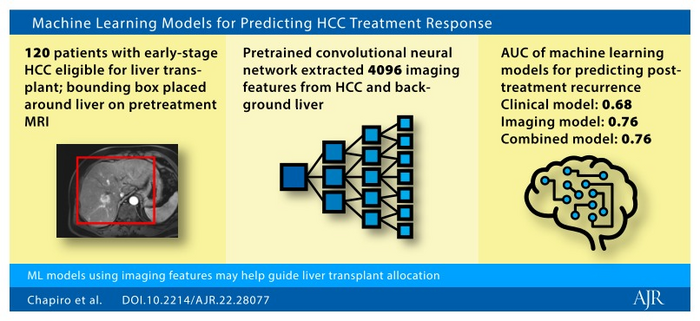Leesburg, VA, August 17, 2022—According to ARRS’ American Journal of Roentgenology (AJR), machine learning models applied to presently underutilized imaging features could help construct more reliable criteria for organ allocation and liver transplant eligibility.

Credit: ARRS & AJR
Leesburg, VA, August 17, 2022—According to ARRS’ American Journal of Roentgenology (AJR), machine learning models applied to presently underutilized imaging features could help construct more reliable criteria for organ allocation and liver transplant eligibility.
“The findings suggest that machine learning-based models can predict recurrence before therapy allocation in patients with early-stage hepatocellular carcinoma (HCC) initially eligible for liver transplant,” wrote corresponding author Julius Chapiro from the department of radiology and biomedical imaging at Yale University School of Medicine in New Haven, CT.
Chapiro and colleagues’ proof-of-concept study included 120 patients (88 men, 32 women; median age, 60 years) diagnosed with early-stage HCC between June 2005 and March 2018, who were initially eligible for liver transplant and underwent treatment by transplant, resection, or thermal ablation. Patients underwent pretreatment MRI and posttreatment imaging surveillance, and imaging features were extracted from postcontrast phases of pretreatment MRI examinations using a pretrained convolutional neural network (VGG-16). Pretreatment clinical characteristics (including laboratory data) and extracted imaging features were integrated to develop three ML models—clinical, imaging, combined—for recurrence prediction within 1–6 years posttreatment.
Ultimately, all three models predicted posttreatment recurrence for early-stage HCC from pretreatment clinical (AUC 0.60–0.78, across all six time frames), MRI (AUC 0.71–0.85), and both data combined (AUC 0.62–0.86). Using imaging data as the sole model input yielded higher predictive performance than clinical data alone; however, combining both data types did not significantly improve performance over use of imaging data alone.
An electronic supplement to this AJR article is available here.
North America’s first radiological society, the American Roentgen Ray Society (ARRS) remains dedicated to the advancement of medicine through the profession of medical imaging and its allied sciences. An international forum for progress in radiology since the discovery of the x-ray, ARRS maintains its mission of improving health through a community committed to advancing knowledge and skills with the world’s longest continuously published radiology journal—American Journal of Roentgenology—the ARRS Annual Meeting, InPractice magazine, topical symposia, myriad multimedia educational materials, as well as awarding scholarships via The Roentgen Fund®.
MEDIA CONTACT:
Logan K. Young, PIO
44211 Slatestone Court
Leesburg, VA 20176
703-858-4332
Journal
American Journal of Roentgenology
DOI
10.2214/AJR.22.28077
Method of Research
Observational study
Subject of Research
Animals
Article Title
Machine-Learning Models for Prediction of Posttreatment Recurrence in Early-Stage Hepatocellular Carcinoma Using Pretreatment Clinical and MRI Features: A Proof-of-Concept Study
Article Publication Date
17-Aug-2022
COI Statement
The authors declare no conflict of interest.



